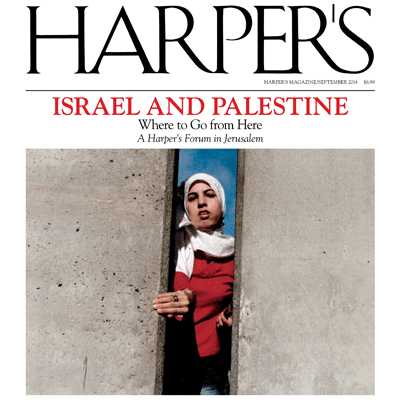Introducing the September 2014 Issue
Where Israel and Palestine can go from here, Washington D.C.’s enduring legacy of racial strife, Edward O. Wilson on free will, and more
 We convened the Forum in Jerusalem that became this month’s cover story the very evening three Israeli teenagers were kidnapped on the West Bank, beginning weeks of bloodshed. The panelists — prominent Israelis and Palestinians whom we wouldn’t have been able to get together in the same room had we waited another week — were charged with discussing the question: What if nothing changes? Their answers and comments were prescient and cast light on the causes of the current crisis. (Some were also quite contentious.) Until I listened to our panelists speak, I didn’t really understand the complexities of the situation. Having been raised in New York City as a mostly secular Jew, I was an automatic supporter of Israel — even if I had never set foot in the country before. But the discussion, with its airing of grievances on both sides, gave me a much broader understanding. I had also expected, as a first-time visitor, to be impressed by all things Israeli — the Western Wall, the old city of Jerusalem — yet I found myself not at all moved by the religious symbols. What did move me was a visit to a collective farm north of Tel Aviv that embodied the old socialist promise of Israel.
We convened the Forum in Jerusalem that became this month’s cover story the very evening three Israeli teenagers were kidnapped on the West Bank, beginning weeks of bloodshed. The panelists — prominent Israelis and Palestinians whom we wouldn’t have been able to get together in the same room had we waited another week — were charged with discussing the question: What if nothing changes? Their answers and comments were prescient and cast light on the causes of the current crisis. (Some were also quite contentious.) Until I listened to our panelists speak, I didn’t really understand the complexities of the situation. Having been raised in New York City as a mostly secular Jew, I was an automatic supporter of Israel — even if I had never set foot in the country before. But the discussion, with its airing of grievances on both sides, gave me a much broader understanding. I had also expected, as a first-time visitor, to be impressed by all things Israeli — the Western Wall, the old city of Jerusalem — yet I found myself not at all moved by the religious symbols. What did move me was a visit to a collective farm north of Tel Aviv that embodied the old socialist promise of Israel.
Anand Gopal, who has previously written for Harper’s Magazine about Syria (in our April 2012 issue), this month reports on his visit to Kandahar, Afghanistan, where he went to investigate a series of gruesome murders. The information he turned up by talking to counterterrorism officials and Kandahari citizens landed him in a jail cell, from which he was released, with help from the American military, only on condition that he leave the city and never return. Return he did, though — and in the course of his second visit, Gopal traced the murders with near certainty to a local police commander.
Edward O. Wilson’s essay discusses the complexities of the human brain and the neurological basis for consciousness, which philosophers have been trying to explain for the past two thousand years. What enables the brain to make decisions on its own? If consciousness “has a material basis,” asks Wilson, “can the same be true for free will?” His answer is optimistic.
In his Letter this month, “Washington Is Burning,” Andrew Cockburn turns to some family history. It seems it was his ancestor Sir George Cockburn who burned Washington, D.C. to the ground during the War of 1812, while he was at the head of a regiment of former slaves enlisted from neighboring plantations with a promise of freedom. Pleased with his new recruits, Sir George noted that they excited “the most general & undisguised alarm” among the white population — a situation all too reminiscent of modern-day race relations in our nation’s capital.
On September 10, 2012, the Egyptian newspaper Youm7 published an article criticizing the depiction of Muhammad in the film The Innocence of Muslims. The next day, furious rioting began outside the American embassy in Cairo, with hordes of protesters eventually storming the compound’s fortified walls. In this month’s Annotation, Emad Mekay reveals an unlikely culprit behind the civic disturbance: Youm7 was being secretly funded by the U.S. State Department both before and after the protests.
Also in this issue, retired Army lieutenant general Daniel Bolger argues, most persuasively, that American losses in Iraq and Afghanistan were due to misjudgments and misunderstandings on the part of our military leaders. For his first Easy Chair column, John Crowley reflects on his work as a proofreader for the New York Telephone Company, in the very early days of computer-compiled print. Plus: Joseph Stiglitz on what’s wrong with Thomas Piketty’s reasoning; a new story by Rebecca Evanhoe; Alan Hollinghurst on the poets of World War I; David Quammen on Neanderthals; Lili Anolik on Art Pepper and Laurie Pepper’s autobiographies; and excerpts from Ben Lerner’s 10:04 and Marlon James’s Brief History of Seven Killings.


